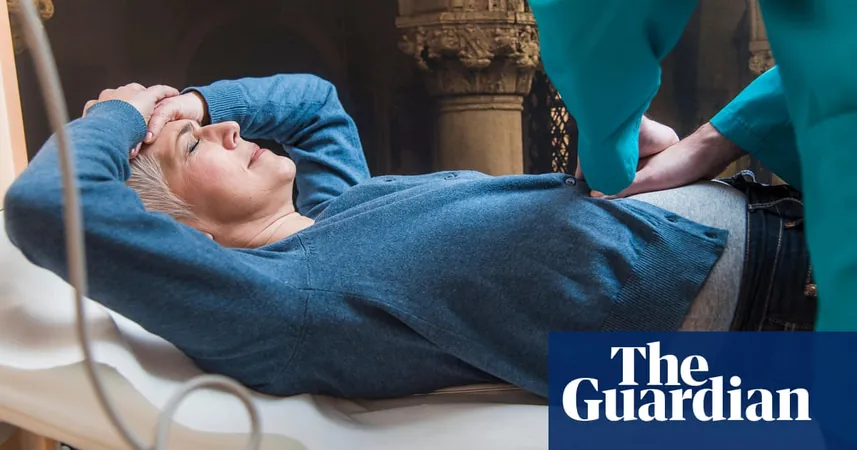
Shocking New Survey: 1 in 4 Women in England Face Serious Reproductive Health Issues
2025-04-10
Author: Sarah
Staggering Statistics Unveiled in Groundbreaking Health Survey
A new survey reveals alarming news for women in England, with over a quarter grappling with serious reproductive health problems. This comprehensive study, which surveyed 60,000 women in 2023 and is the largest of its kind, highlights systemic barriers to care that many women face.
Funded by the Department of Health and Social Care and analyzed by experts from the London School of Hygiene & Tropical Medicine, the findings indicate that 28% of women reported conditions such as pelvic organ prolapse, uterine fibroids, endometriosis, and various cancers.
A Painful Reality: Heavy Bleeding and Severe Pain
Among those surveyed, nearly 19% reported intense period pain, with 40% struggling with heavy menstrual bleeding. Disturbingly, over 30% of young women aged 16-24 faced severe period discomfort.
Dismaying Disparities: The Ethnic Health Gap
The survey also uncovered striking ethnic disparities, revealing that more than a third (38.1%) of Black women reported suffering from reproductive health issues, compared to 27.7% of White women—making Black women 69% more likely to face these challenges.
Notably, 19.8% of Black women reported having uterine fibroids, a stark contrast to only 5% of White women.
Personal Accounts of Suffering and Neglect
Rebecca Brown, a 46-year-old from South London, shared her harrowing experience with uterine fibroids. "The pain was horrendous. I couldn’t walk and had to rely on heat pads daily; my life changed in an instant." After being dismissed by healthcare providers initially, she eventually underwent surgery that revealed 25 sizable fibroids.
Brown, whose background reflects mixed heritage, learned that women like her are often at higher risk for severe fibroid development, emphasizing the need for better education and care within the healthcare system.
A Crisis Ignored: Calls for Urgent Action
Overall, a staggering 74% of participants reported some reproductive health issue, including menstrual problems and menopausal symptoms. Applying these findings to the broader population indicates that more than 10 million women in England face similar challenges.
Dr. Melissa Palmer from the London School of Hygiene & Tropical Medicine said, "This marks the first time we've quantified the extent of reproductive health issues among women in England...the findings highlight the need to address the deep-rooted ethnic inequalities in healthcare."
MP Paulette Hamilton expressed her concerns, stating, "This survey confirms a crisis in reproductive health for Black women, whose pain has long been dismissed or inadequately addressed. Systematic neglect cannot continue. We must prioritize culturally competent care and targeted research."
Ending the Cycle of Inequality
Dr. Ranee Thakar, president of the Royal College of Obstetricians and Gynaecologists, shared a somber perspective, mentioning that conditions like fibroids can devastate women's physical and mental health.
Experts agree that equitable access to culturally sensitive healthcare is essential in combating these disparities. Prof. Faye Ruddock emphasizes the importance of awareness and tailored support to address unique challenges faced by Black women.
In response to the findings, a Department of Health spokesperson assured that addressing these health inequalities is part of their future plans: "Listening to all women is key to ensuring they receive the quality care they deserve, regardless of ethnicity."




 Brasil (PT)
Brasil (PT)
 Canada (EN)
Canada (EN)
 Chile (ES)
Chile (ES)
 Česko (CS)
Česko (CS)
 대한민국 (KO)
대한민국 (KO)
 España (ES)
España (ES)
 France (FR)
France (FR)
 Hong Kong (EN)
Hong Kong (EN)
 Italia (IT)
Italia (IT)
 日本 (JA)
日本 (JA)
 Magyarország (HU)
Magyarország (HU)
 Norge (NO)
Norge (NO)
 Polska (PL)
Polska (PL)
 Schweiz (DE)
Schweiz (DE)
 Singapore (EN)
Singapore (EN)
 Sverige (SV)
Sverige (SV)
 Suomi (FI)
Suomi (FI)
 Türkiye (TR)
Türkiye (TR)
 الإمارات العربية المتحدة (AR)
الإمارات العربية المتحدة (AR)